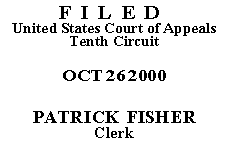

| UNITED STATES OF AMERICA,
Plaintiff-Appellee, v. LINO QUINTANA-OROSCO, Defendant-Appellant. |
|
Defendant Lino Quintana-Orosco pled guilty to conspiracy to possess with intent to distribute more than 100 kilograms of marijuana and was sentenced to sixty months' imprisonment, the statutory mandatory minimum sentence. He did not take a direct appeal. This appeal is from the denial of his motion for habeas relief under 28 U.S.C. § 2255. The district court granted a certificate of appealability on the issue of ineffective assistance of counsel. We thus have jurisdiction over the appeal. See 28 U.S.C. § 2253(a).
Defendant argues on appeal that his former counsel: (1) failed to advise him that a downward departure from the statutory minimum sentence was available under the "safety valve" provision in 18 U.S.C. § 3553(f) and U.S.S.G. § 5C1.2; and (2) failed to seek and accurately advise him concerning a downward adjustment of the guideline range for his role in the offense under U.S.S.G. § 3B1.2. Defendant contends that he was prejudiced by his former counsel's unprofessional errors. See Strickland v. Washington, 466 U.S. 668, 687 (1984).
The magistrate judge appointed counsel and held an evidentiary hearing at which both defendant and his former counsel testified. Based on the evidence, the magistrate judge concluded that counsel did discuss the safety valve provision with defendant. The magistrate judge further found that counsel discussed with defendant an adjustment for his role in the offense, but that the prosecution would not agree to such an adjustment. The district court adopted the magistrate judge's proposed findings and recommendation.
In a proceeding under § 2255, we review the district court's legal conclusions de novo and its factual findings for clear error. See United States v. Pearce, 146 F.3d 771, 774 (10th Cir. 1998). "A district court's factual finding is clearly erroneous only if it is without factual support in the record or if [this] court, after reviewing all the evidence, is left with a definite and firm conviction that a mistake has been made." United States v. Patron-Montano, 223 F.3d 1184, 1188 (10th Cir. 2000) (quotation omitted). We have carefully reviewed the record on appeal in light of the parties' arguments and the appropriate legal standards. We are unpersuaded by defendant's assertions of error, and affirm for substantially the same reasons as those set out in the November 23, 1999 proposed findings and recommendation of the magistrate judge, as adopted by the district court in its December 21, 1999 order.
AFFIRMED.
Entered for the Court
Circuit Judge
*. This order and judgment is not binding precedent, except under the doctrines of law of the case, res judicata, and collateral estoppel. The court generally disfavors the citation of orders and judgments; nevertheless, an order and judgment may be cited under the terms and conditions of 10th Cir. R. 36.3.